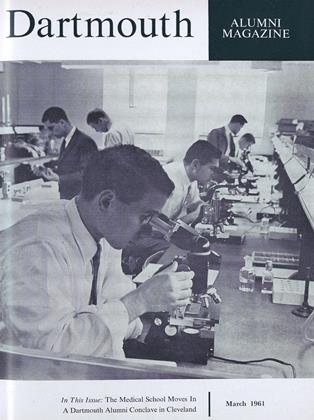In his informal address at the Alumni Council dinner in Cleveland, President Dickey devoted the major part of his remarks to what he described as the "new frontier" in higher education, a frontier "which we are just approaching and are approaching very, very tardily." This is not the frontier of science and technology, as one might quickly assume, he said - "I don't think you have any reason to be concerned that American higher education will not produce the science and technology which our society requires to move into its time" - but it is the pressing challenge to liberal arts education in the Western world to free itself from its provincial heritage. Education that is so largely Western in its origin and in its orientation is no longer realistic in the world of today, he asserted.
President Dickey did not minimize the difficulty of changing educational habits and outlook "to accommodate the universal aspects of human experience as rapidly and as fundamentally as I believe we must now recognize they must be incorporated into higher education if higher education is to be liberating for our time and the times immediately ahead.
"There are vested interests in education, there are rigidities, there are habits of mind, there are problems of training men which almost defy the time factor in this need of ours to readjust. In my view this is the great new frontier of liberal learning which we are now only dimly perceiving, and which has in considerable measure been brought upon us without our knowing it by the fact that we have penetrated the frontiers of science and technology. We are now confronted with the devilish business of attempting to relate our western education to the total disparities of the world and also, paradoxical as it is, the total oneness of this world brought upon us. I have no magic for doing this. I think the point at which we begin is where we begin with any problem - awareness.
"Any man who proposes introducing more knowledge into a curriculum already overburdened with knowledge has the burden of proof on him to say how it might be done. I shall only suggest that the principal possibility I see for doing this is to introduce into all liberal studies the strategy of comparative study. I see no possibility that we can ever attempt within the formal years of education to study the entire experience of man in all the different cultures and still master anything. But what does seem to me to be possible, and absolutely necessary, is that we might adjust our approach to knowledge and to the human experience throughout all cultures so that we teach all subjects on a universal basis.
"I am talking here about non-scientific subjects, because the scientific subjects, as every scientist knows, have been taught, without even thinking about it, on a universal basis. There is no American experience in science, no Russian experience; there is simply science. And when one comes to the humanities and the social sciences, I suggest that we will find our way out of this dilemma probably if we find our way to introducing into liberal learning the use of comparative study - that is, studying a subject not in a sequential or chronological way through the entire subject, but rather by cutting across literature, philosophy, the arts, government and economics by introducing the principle of comparative learning as the central pedagogical principle of liberal learning in the future. I see no other possibility that liberal learning can be for our time and for the times ahead a genuinely liberating experience that will permit our sons and daughters to have a relationship to the reality of the world which bears upon them and which they aspire to lead and influence. I hope Dartmouth may have her full share in this great effort."
President Dickey spoke also of the priority now given to education in American life and of stepped-up efforts which mean that no college today can be "just pretty good" and hold its place. To maintain its forward momentum, he said, Dartmouth must rely very heavily on the support that comes from the annual Alumni Fund - "a support based not upon emotional appeals to participation, important as they have been in the life of Dartmouth, but support that is given because somebody believes this is the very best way to invest what is within his power to invest beyond his own personal, immediate needs."
 View Full Issue
View Full Issue
More From This Issue
-
 Feature
FeatureConclave in Cleveland
March 1961 -
 Feature
FeatureTHE MED SCHOOL MOVES IN
March 1961 -
 Article
ArticleWinter Sports
March 1961 By CLIFF JORDAN '45 -
 Article
ArticleTHE UNDERGRADUATE CHAIR
March 1961 By TOM DALGLISH '61 -
 Article
ArticleThe Ford Peace Expedition of 1915
March 1961 By F. STIRLING WILSON '16 -
 Class Notes
Class Notes1956
March 1961 By STEWART SANDERS, JAMES L. FLYNN
Features
-
 Cover Story
Cover StoryThe Untouchables
April 1981 -
 Cover Story
Cover StoryThe Blackboard
May 1998 By Castle Freeman Jr. -
 FEATURES
FEATURESNo Limits
SEPTEMBER | OCTOBER 2022 By CHRIS QUIRK -
 Feature
FeatureConquest of the Antarctic
June 1957 By DAVID C. NUTT '41 -
 Feature
FeatureCastles in the Clouds
MAY 1978 By George Hathorn -
 Feature
FeatureFaith
SEPTEMBER 1996 By Seward, "Pat" Brewster '50

